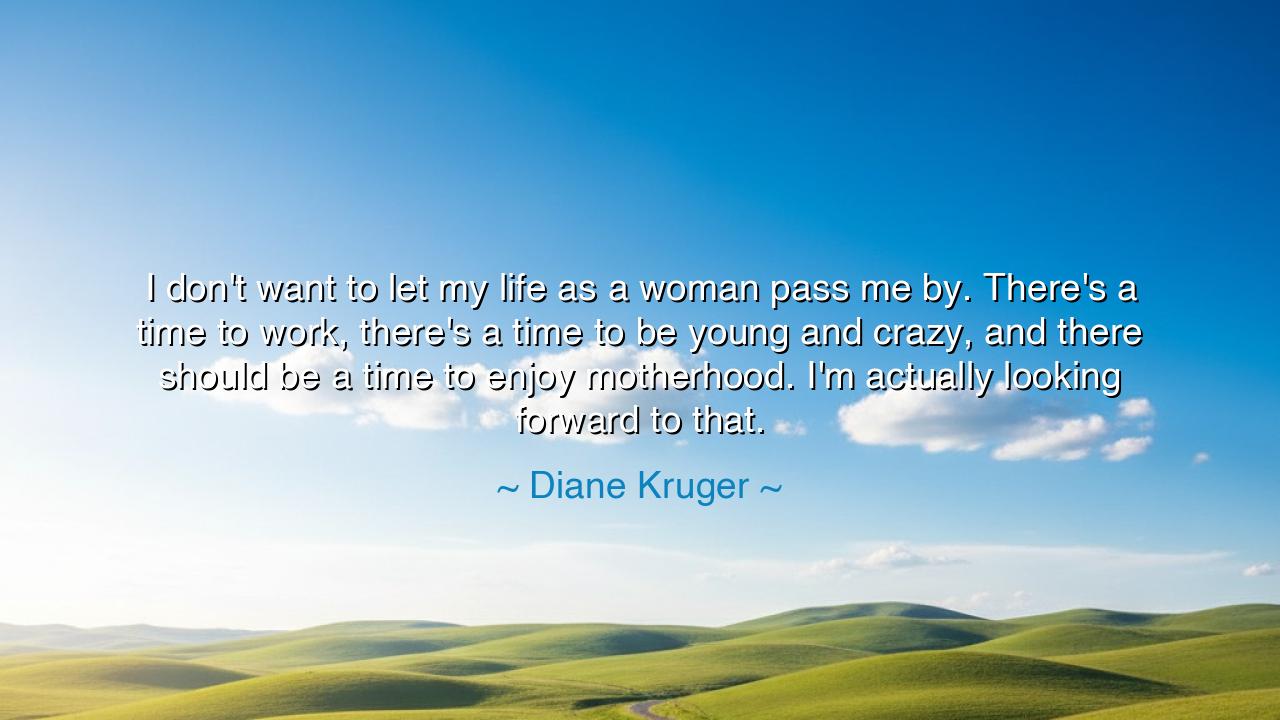
I don't want to let my life as a woman pass me by. There's a time
I don't want to let my life as a woman pass me by. There's a time to work, there's a time to be young and crazy, and there should be a time to enjoy motherhood. I'm actually looking forward to that.






When Diane Kruger said, “I don’t want to let my life as a woman pass me by. There’s a time to work, there’s a time to be young and crazy, and there should be a time to enjoy motherhood. I’m actually looking forward to that,” she spoke with the wisdom of one who had come to understand the sacred rhythm of existence — the balance between ambition and being, between striving and surrender. Her words are not only a reflection on womanhood, but a hymn to the cyclical nature of life itself. In them echoes an ancient truth: that every season of life has its own purpose, and to neglect any of them is to rob oneself of wholeness.
In the language of the ancients, such a declaration would have been seen as an ode to harmony — to the art of living fully in all dimensions of the self. For womanhood, like the earth itself, moves through seasons: the spring of youth and discovery, the summer of passion and creation, the autumn of nurture and harvest, and the winter of reflection and wisdom. Kruger’s insight is a recognition of this eternal pattern. She acknowledges that while the world often pushes us to choose — between work and love, between ambition and tenderness — true fulfillment lies not in renunciation, but in the embrace of every phase. To be a whole person, one must honor both the striving spirit and the nurturing heart.
The origin of this quote can be found in Kruger’s reflections on her own life and career. As an actress celebrated for her beauty and discipline, she lived much of her youth in the fast, demanding pace of her profession. Yet as she matured, she began to see that life’s greatest art is not performed on screen or stage, but in the quiet acts of love and creation that unfold in the intimacy of home and family. Her longing to experience motherhood was not a retreat from ambition, but a deepening of it — a desire to live completely, to pour her energy not only into roles and achievements, but into life itself.
The ancients often spoke of the balance between the inner and outer worlds. The Greeks called it sophrosyne — the harmony of the soul that comes when one lives according to nature’s rhythm, neither rushing nor delaying the appointed seasons of life. A life spent only in pursuit of work, fame, or youth, they warned, becomes like a field sown endlessly but never harvested. Kruger’s words remind us of this same truth: that joy is not found in endless motion, but in timely stillness, in knowing when to labor and when to rest, when to chase dreams and when to cradle them.
Consider the story of Penelope, wife of Odysseus, who in ancient myth embodied patience and wisdom. While her husband journeyed across seas, she wove and un-wove her tapestry, waiting, nurturing, creating — not idle, but alive in her own quiet purpose. Hers was not the glory of war or conquest, but the glory of constancy, of tending to life’s deeper threads. In her, as in Kruger’s reflection, we see that the art of womanhood — indeed, of humanity — is not in denying one’s desires or duties, but in weaving them together into a life that honors every part of the self.
Kruger’s words also carry a subtle defiance — a refusal to let society dictate the tempo of her existence. In a world that often demands perpetual productivity and measures worth by visible achievement, her wish “not to let life pass by” is a radical act of presence. She reminds us that time is sacred — not to be hurried, not to be hoarded, but to be lived. To pause and savor the seasons of love, growth, and nurture is not weakness; it is wisdom. For even the sun must set before it rises again, and even the most powerful heart must rest to beat anew.
So, my listener, let this reflection be your guide: live the fullness of your seasons. Do not cling too tightly to one, nor rush heedlessly into the next. Work with purpose, play with freedom, love with devotion, and when the time comes to nurture — whether it be a child, a dream, or a new chapter of yourself — embrace it without fear. Every stage of life is a gift, and each contains a different kind of strength. The youth who strives, the mother who nurtures, the elder who reflects — all are faces of the same eternal soul.
For as Diane Kruger teaches, fulfillment is not found in choosing between the paths of ambition and love, but in walking them both with grace. To live as a whole being is to honor every phase of your existence — to celebrate the wildness of youth, the dignity of work, and the quiet, sacred joy of creation. Only then can one truly say, as the ancients might have, “I have not let my life pass me by; I have lived it in full measure, and it has been beautiful.”






AAdministratorAdministrator
Welcome, honored guests. Please leave a comment, we will respond soon